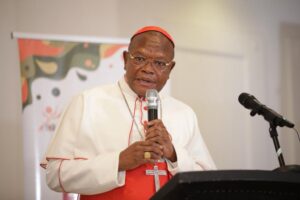Synthesis of the responses from the African Episcopal Conferences to the Declaration Fiducia Supplicans
Dear brothers and sisters in the Lord,
Grace and Peace!
The message that I transmit to you today has received the agreement of His Holiness Pope Francis and of His Eminence Cardinal Víctor Manuel Fernández, Prefect of the Dicastery for the Doctrine of the Faith.
It presents a consolidated summary of the positions adopted by various National and Inter-territorial Episcopal Conferences across the African continent, in response to the publication of the Declaration Fiducia supplicans of the Dicastery for the Doctrine of the Faith of December 18, 2023. Within the Church family of God in Africa, this Declaration has caused a shockwave, it has sown misconceptions and unrest in the minds of many lay faithful, consecrated persons and even pastors and has aroused strong reactions.
The synthesis of the responses of the African Episcopal Conferences highlights a common understanding and approach on their part. It encompasses their views on the unchanged doctrine of marriage within the Church, the pastoral care extended to all members of the Church and their unified position on same-sex unions.
1. Unchanged doctrine on marriage and sexuality
In their various messages, the Episcopal Conferences of the Church family of God in Africa begin by reaffirming their unwavering attachment to the Successor of Peter, their communion with him and their fidelity to the Gospel. They recognize collectively that the Church’s doctrine on marriage and the family remains unchanged. They all noted the passages where Fiducia supplicans reaffirmed this traditional position of the Church and explicitly excluded the recognition of homosexual marriage. This position, rooted in the Sacred Scriptures, has been taught without interruption by the universal Magisterium of the Church. Therefore, rites and prayers that could blur the definition of marriage – as an exclusive, stable and indissoluble union between a man and a woman, open to procreation are considered as unacceptable. The distinction made by Fiducia supplicans between liturgical blessings or formal ritual blessings and spontaneous blessings is not intended to mandate that there be blessings for couples in irregular situations and same-sex couples (cf. 31) even if the document says that they “should be carried out outside liturgical frameworks” (cf. 31 & 38).
2. Pastoral care and guidance
Through the declarations of the Episcopal Conferences, the Church in Africa, as the family of God, reaffirms its commitment to continuing pastoral assistance to all its members. Clergy are encouraged to provide welcoming and supportive pastoral care, particularly to couples in irregular situations. The African Bishops’ Conferences emphasize that people with a homosexual tendency must be treated with respect and dignity, while reminding them that unions of persons of the same-sex are contrary to the will of God and therefore cannot receive the blessing of the Church.
3. Position on homosexual unions and same-sex couples
The Episcopal Conferences generally prefer-each Bishop remaining free in his diocese not to offer blessings to same-sex couples. This decision stems from concern about potential confusion and scandal within the Church community. The constant teaching of the Church describes homosexual acts as “intrinsically disordered” (Congregation for the Doctrine of the Faith, Declaration Persona Humana, n. 8) and contrary to the natural law. These acts, considered as closing the sexual act to the gift of life and not proceeding from a genuine affective and sexual complementarity, must not be approved under any circumstances (Catechism of the Catholic Church, n. 2357).
To support this position, a large majority of the interventions of the African Bishops are based above all on the Word of God. They cite passages which condemn homosexuality, notably Lv 18:22-23 where homosexuality is explicitly prohibited and considered an abomination. This legislative text testifies to these practices in the setting of Israel, as well as other practices that God prohibits, such as infanticide (cf. the sacrifice of Isaac). One Episcopal Conference added the scandal of the homosexuals of Sodom (cf. Gen 19, 4-11). In the narration of the text, homosexuality is so abominable that it will lead to the destruction of the city. In the New Testament, Saint Paul, in the Letter to the Romans, also condemns what he calls unnatural relationships (cf. Rom 1:26-33) or shameful morals (cf. 1 Cor 6:9-10).
In addition to these biblical reasons, the cultural context in Africa, deeply rooted in the values of the natural law regarding marriage and family, further complicates the acceptance of unions of persons of the same sex, as they are seen as contradictory to cultural norms and intrinsically corrupt.
4. Concluding statement
In summary, the Episcopal Conferences across Africa, which have strongly reaffirmed their communion with Pope Francis, believe that the extra-liturgical blessings proposed in the Declaration Fiducia supplicans cannot be carried out in Africa without exposing themselves to scandals. They remind, as Fiducia supplicans clearly does, the clergy, religious communities, all believers and people of good will, that the Church’s doctrine on Christian marriage and sexuality remains unchanged. For this reason, we, the African Bishops, do not consider it appropriate for Africa to bless homosexual unions or same-sex couples because, in our context, this would cause confusion and would be in direct contradiction to the cultural ethos of African communities. The language of Fiducia supplicans remains too subtle for simple people to understand. Furthermore, it remains very difficult to be convincing that people of the same sex who live in a stable union do not claim the legitimacy of their own status. We, African Bishops, insist on the call for the conversion of all.
Like Hosea, Jesus comes to bear witness to the tenderness of God: “He did not come to call the righteous, but sinners” (Mt 9:3). Of this there is no doubt. But Jesus also stretches out his hand to the sinner so that he may rise, so that he may convert (cf. Mk 1:5). After showing such tenderness to the woman caught in adultery, he said to her: “Go, and from now on, sin no more” (Jn 8:11). As the salt of the earth and the light of the world (cf. Mt 5:13-14), the merciful mission of the Church is to go against the tide of the spirit of the world (cf. Rom 12:2) and to offer it the best, even if it is demanding.
Some countries prefer to have more time for the deepening of the Declaration which, in fact, offers the possibility of these blessings but does not impose them. In any case, we will continue to reflect on the value of the general theme of this document, apart from just blessings for couples in an irregular situation, that is to say on the richness of spontaneous blessings in everyday pastoral care.
Grace and peace
“Grace and peace”; it is with these words taken from Saint Paul in communion with His Holiness Pope Francis and all the African Bishops, that as President of the Symposium of Episcopal Conferences of Africa and Madagascar (SECAM), I conclude this message thus calling on Christian communities not to allow themselves to be shaken. His Holiness Pope Francis, fiercely opposed to any form of cultural colonization in Africa, blesses the African people with all his heart and encourages them to remain faithful, as always, to the defense of Christian values.
Given at Accra, January 11, 2024
Fridolin Cardinal AMBONGO, ofm cap
Metropolitan Archbishop of Kinshasa
PRESIDENT OF SECAM


